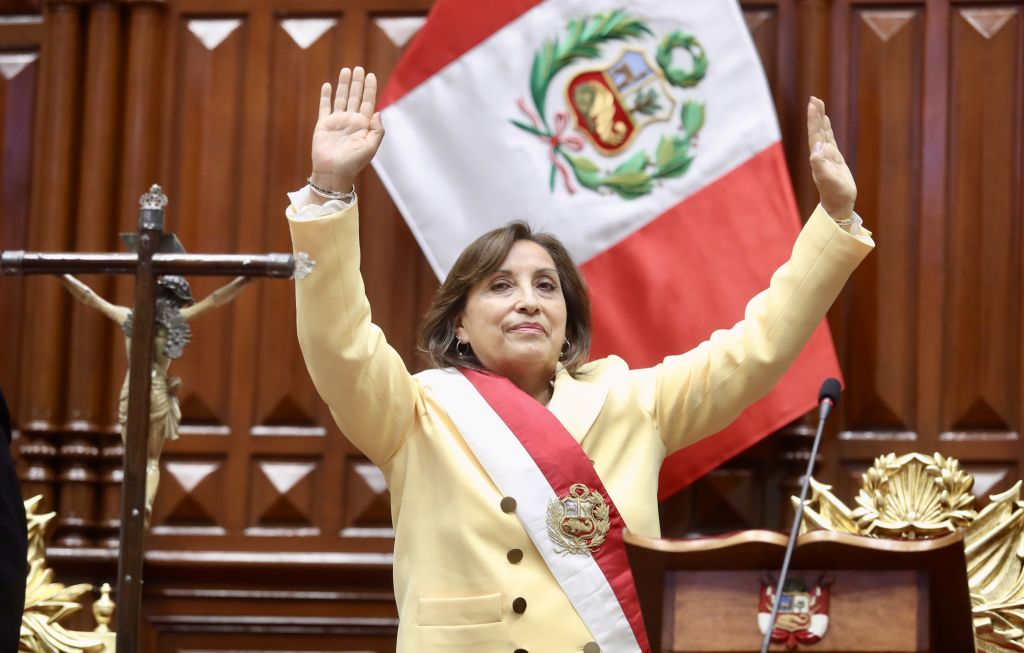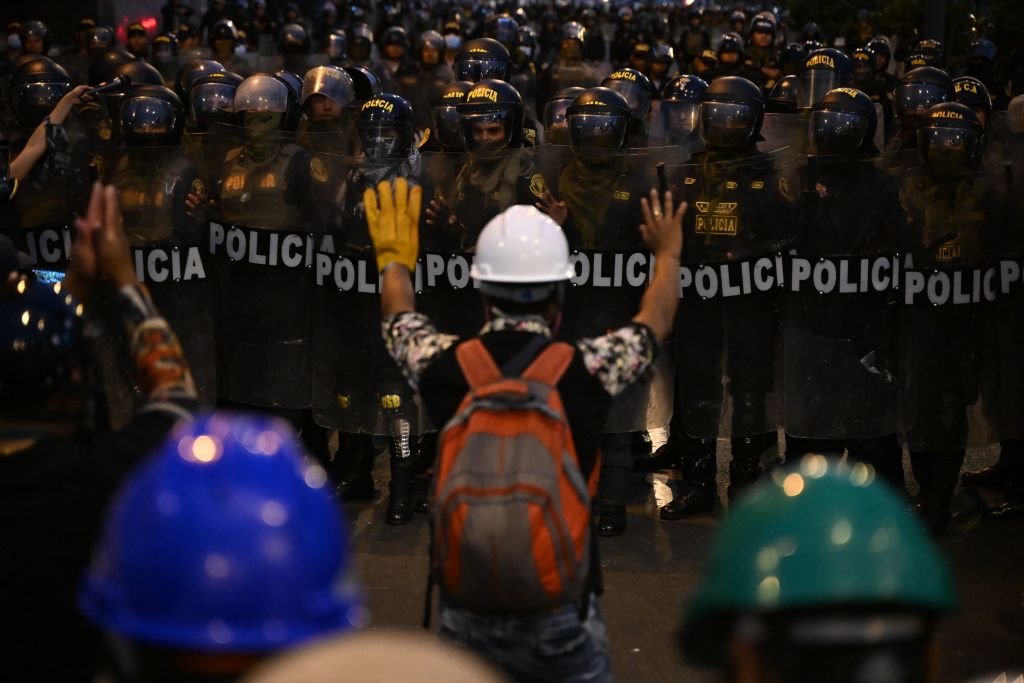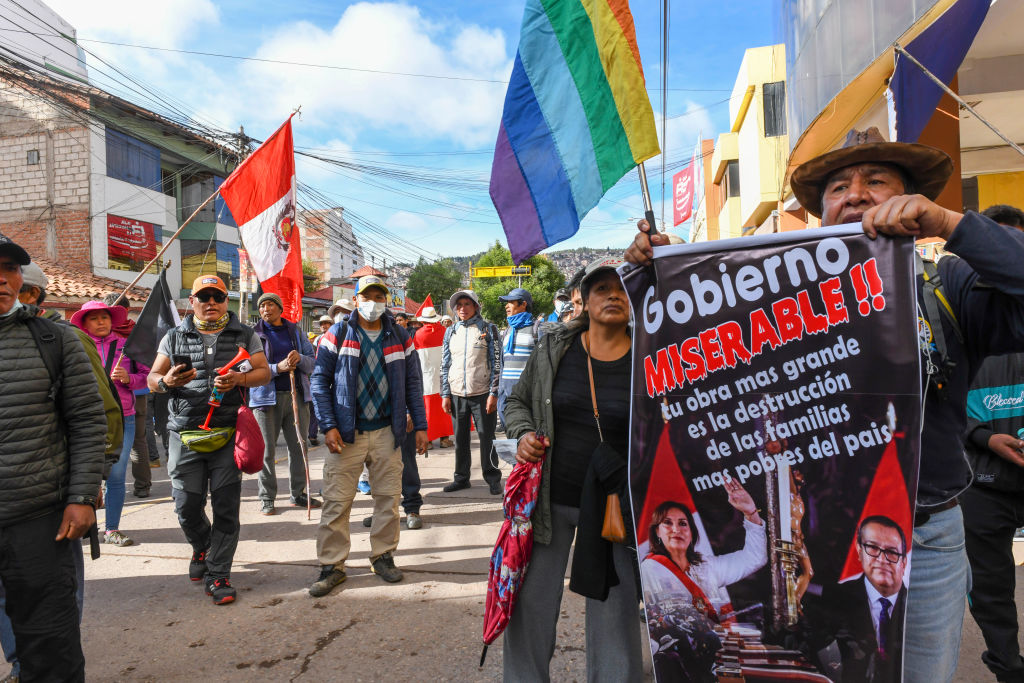LIMA, Peru—When Dina Boluarte was abruptly sworn in on Dec. 7, 2022, the fact that she was the first female president in Peru’s 201-year history was widely noted, yet barely explored by Peruvian media. Journalists had other things on their minds: Boluarte’s inauguration took place just hours after her predecessor Pedro Castillo was impeached for attempting to dissolve Congress and rule by decree, bringing down the curtain on a 17-month administration that had tipped the Andean republic into unremitting political instability and chaos.
Boluarte’s professional credentials as a lawyer felt like a qualitative leap forward for the presidency—regardless of the fact that she, like her predecessor, had never held public office before becoming vice president for the self-declared Marxist-Leninist Free Peru party in the June 2021 elections.
The youngest of 14 children from a working-class family in the remote Andean market town of Chalhuanca, nearly 10,000 feet above sea level, Boluarte said in her maiden presidential speech that her priority would be to fight for “the nobodies, the excluded, the others, to have the opportunity and access that has historically been denied to them.”

“More than a politician, I am a Peruvian citizen and mother who fully understands the high responsibility that history has put on my shoulders,” she declared. “Responding to that high responsibility is [a show of] my respect for the millions of Peruvian mothers who day after day provide sustenance for their families.”
Now, three months since Boluarte’s swearing in, her presidency has descended into a dark mess of severe human rights violations, its legitimacy decimated by allegations of principle-free political opportunism, brutal authoritarianism, and racism. It looks increasingly inevitable that Peru’s first ever female president will face a similar fate to Castillo, the country’s first ever campesino president (in Peru, the term means someone of indigenous ancestry who works the land), with a post-presidency dogged by legal problems and a potentially lengthy jail sentence.
At the time of writing, 48 Peruvians had been killed by security forces, some while protesting violently; some while demonstrating peacefully; and some who were just bystanders, including a medical intern treating an injured protester. Another dozen people died after protestors’ road blockades prevented them from receiving emergency medical treatment, and one police officer was found dead in a burnt-out patrol car.
In a searing report released in February, Amnesty International warned that Boluarte had presided over an out-of-control police and armed forces that, motivated by “systemic racism ingrained in Peruvian society,” had repeatedly violated international human rights standards by using “lethal ammunition to control demonstrations.” Many Peruvians view Boluarte as having blood on her hands. Three-quarters want her to resign.
“We are not celebrating her presidency,” Indigenous feminist activist Tarcila Rivera Zea said. “For us, it has meant pain and sadness, with so many deaths. More than anything else, it is a feeling of frustration and disappointment.

Boluarte, 60, who is bilingual in Spanish and the indigenous Quechua language, started her presidency relatively well. Indeed, in her inaugural address, she distanced herself from Castillo, referencing her “revulsion” at his flagrant alleged graft and condemning his “attempted coup.” Having been expelled from the Free Peru party nearly a year earlier after openly disagreeing with the party’s more extreme politics—and after managing to stay clear of her predecessor’s endless corruption scandals—she had some credibility in the matter.
But her legacy, to the extent she has one, will remain inseparable from that of her predecessor. This is not only a matter of the authoritarian excesses of her leadership over security forces, but also her emphasis on social conservatism, which has been one of the few areas of common ground between Free Peru’s presidential administrations and the hard-right congressional majority. Free Peru’s campaign manifesto has even been accused of advocating “machismo Leninism” for accusing the state of “subcontracting” its obligation to provide for the children of separated parents to absent fathers by requiring them to pay child support.
“It’s also a lesson learned,” Rivera Zea added. “What her presidency shows is that it is not enough to be a woman or speak Quechua if you don’t have that sensibility or identification with the historically excluded. She could have been a president who showed strength, wisdom, justice, and respect for human rights. Instead, she has aligned herself with the worst in Peruvian politics.”
Far from being carried on the back of a feminist wave, Boluarte’s rise to power came at a particularly challenging time for gender rights in Peru, even as some other Latin American nations have been relaxing restrictions on abortion and increasingly tackling gender violence. Peru was already one of the most socially conservative societies in Latin America, with what are thought to be some of the highest rates of sexual violence in the region, and where abortion is only allowed in cases where the mother’s health is at risk.
It is unclear whether Boluarte has ever identified with the feminist movement, although she has shown an appreciation of gender issues. “[Boluarte’s] not a feminist in the sense of a feminist activist,” Alexandra Ames, a political scientist at Lima’s University of the Pacific, said. “But she’s definitely a woman who feels that she has got ahead by working hard, harder than men would normally have to, and seems to have that awareness.”
While she was vice president, Boluarte also served as minister for development and social inclusion, a role that would normally have a strong gender component. During that time, gender rights came under a sustained assault from lawmakers, one that might have been met with effective resistance from a different executive.
Members of Congress sought to further restrict already highly limited abortion rights with a blanket ban, and change the name of the Ministry of Women to the Ministry for the Family—a switch that in Peru’s machista society could have potentially life-and-death policy consequences for, for example, women facing abusive partners.
But the most damaging counter reform has been a new law allowing parents to block classes with a gender focus—or, as Peruvian conservatives call it, gender ideology.
First introduced to the national curriculum in 2004, gender focus concepts, which include sex education, were aimed at raising awareness among boys and girls of the harms caused by Peru’s patriarchal culture—everything from wage disparities to femicide. Conservatives, often fundamentalist evangelical Christians, caricature gender focus as “cultural Marxism” that encourages premature sexual activity and pressures children into homosexuality and transgenderism.
“Getting rid of gender focus will do enormous damage,” warned Gloria Montenegro, former minister of women. “You’re getting rid of sex education, of a girl’s right to understand herself, to make informed choices, or have good self-esteem. What is so lamentable is that in Peru, we already have so many cases of physical and sexual abuse, of women being raped, often in their own homes, and this is going to make all of that worse.”
Throughout the debate over the curriculum, Boluarte was notable for her silence. She did, at different points during her work as a minister, show protocolary support for gendered development policies, including to empower indigenous women. But she failed to provide any substantive leadership, much less confront the attack on gender focus.
Boluarte did restore gender parity in her government after Castillo’s notorious cabinet appointments, which were not just overwhelmingly male but frequently involved ministers with a track record of misogynistic statements and even domestic abuse—including, briefly, one prime minister.
Ironically, however, that parity was just a return to the status quo ante in a country which, despite its entrenched patriarchy, had previously had some half dozen female prime ministers. Indeed, at one point, just before Castillo’s surprise election victory, almost all the major roles of state barring the presidency had been occupied by women, including the prime minister, foreign minister, defense minister, speaker of Congress, chief prosecutor, head of the judiciary, and chair of the constitutional court.
Boluarte’s term is scheduled to end in 2026, although the deadly repression of anti-government protests means she faces huge and potentially irresistible pressure to resign. Either way, her story as Peru’s first female president seems unlikely to end happily.
Montenegro said Boluarte’s mistake was not realizing she didn’t need to cross the political aisle to build a base of power. “She abandoned the Free Peru program, which, as a party of the left, had a strong social agenda, especially for rural Peru,” she said. “She’s an Andean woman; she should have understood. Where’s the political skill, the ability to broker political compromise and then sell that to the population?”
Protesters are now demanding a constituent assembly to draft a new constitution capable of addressing stark economic injustices. However, a new constitution could also entrench gender inequality. Although there have been no polls on the issue of gender rights in a new constitution, surveys show that most voters want a conservative Magna Carta when it comes to social issues, including prohibiting same-sex marriage and reinstating both compulsory military service and the death penalty.
As for Boluarte personally, the moment she loses her presidential immunity she faces criminal exposure as a head of government who presided over heavily armed police and soldiers gunning down anti-government protesters.
“She’s going to have very serious problems with the justice system,” Montenegro said. “She doesn’t seem to understand that there is no statute of limitations for human rights violations.”


 Simeon Tegel
Simeon Tegel
